Volleyball is a sport with many detailed rules and to have a smooth game flow and a fair contest requires a team of officials. Whether they are professionals or volunteers, these people are crucial to the game being a fair, fun, and exciting experience for both the teams and the fans.
What Are The Referees Called In Volleyball?
There are several officials that participate in volleyball games:
- 1 1st Referee
- 1 2nd Referee
- 1 Scorer
- 2-4 Line Judges
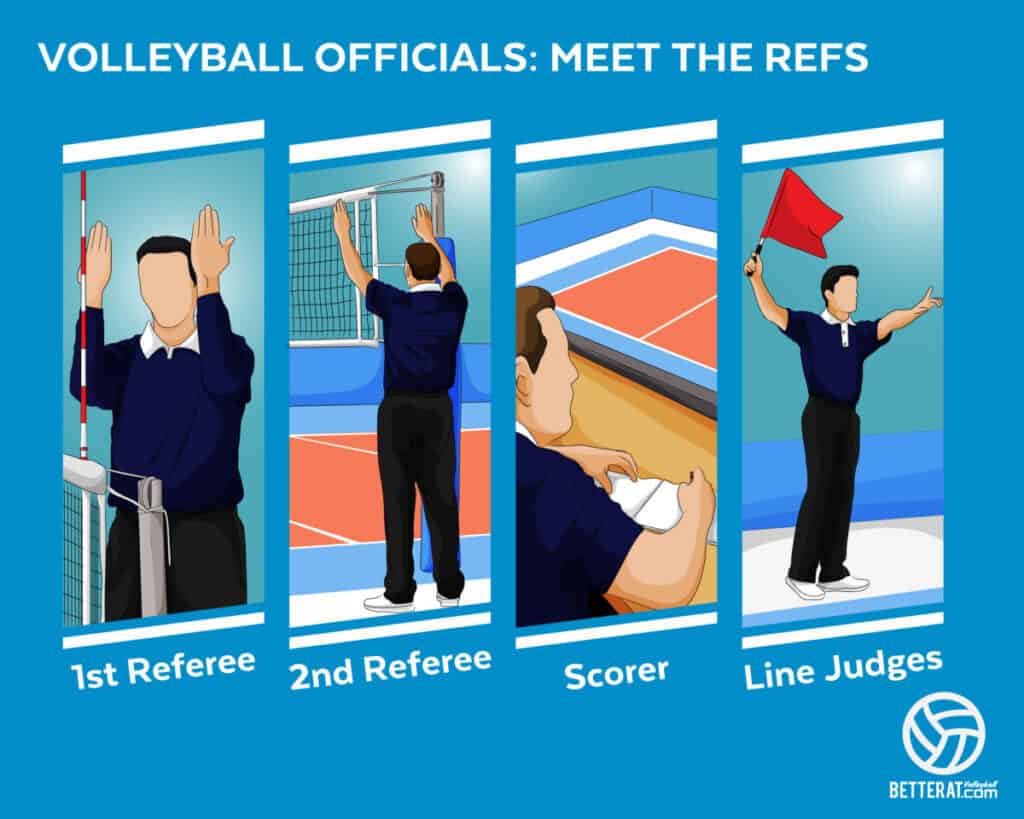
In many instances, an assistant scorer is also required.
Would you like to find our recommended equipment for volleyball officials? Check out our Officials Equipment page.
What Does The 1st Referee Do?
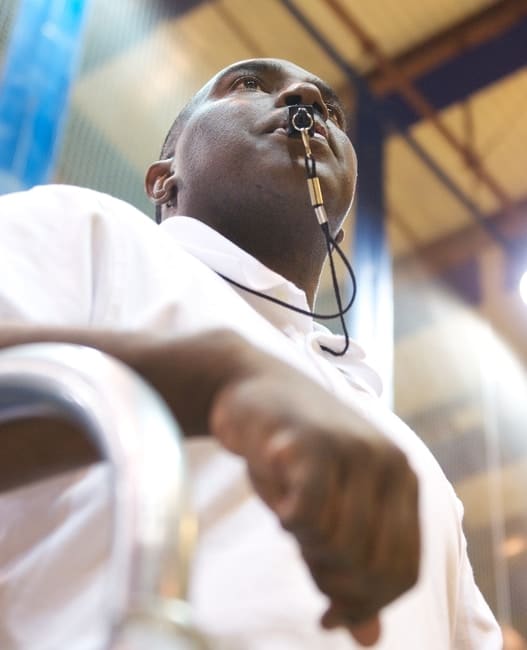
As the name implies, the 1st Referee is the leader of the officials and is in charge of managing the entire match. His or her decisions are final and can overrule any of the other officials if they believe that call was a mistake. 1st Referees may even replace other officials during the match if they believe they are not executing their function properly.
The 1st Referee is the one who takes the position above the net, usually in a referee’s stand. This is located across the court from the scorer’s table. Because of their physical position, the 1st Referee is often called the “Up Ref”.
Before The Match The 1st Referee:
- Inspects the equipment, the balls, and the playing area to verify their conditions are satisfactory.
- Performs the coin toss with the captains from each team.
- Manages the teams’ warm-up periods.
During The Match The 1st Referee:
- Signals the beginning of each rally by signaling the server.
- Calls faults and violations of the rules.
- If they end the rally due to a fault, they signal the kind of fault and indicate the team to serve the next rally.
- May issue warnings or sanctions to teams for misconduct or delays.
At The End Of The Match The 1st Referee:
- Signals the end of the match.
- Checks and signs the scorecard.
What Does The 2nd Referee Do?
The 2nd Referee is a very important role that is more than just an assistant to the 1st Referee. They have specific functions that are important to the flow of the game.
In many cases, this is an official just as qualified as the 1st Referee and they may trade duties from match to match, but not during the match unless the 1st Referee is somehow unable to continue officiating the match.
In other cases (for instance during club tournaments) a different team will be assigned to “work” as officials during the match and a player (often, but not necessarily, the team’s captain) will serve as the 2nd Referee.
The 2nd Referee stands on the floor at the end of the net, outside the playing area, closest to the scorer’s table and opposite the 1st Referee. Because of their physical location during the match, the 2nd Referee is often called the “Down Ref”.
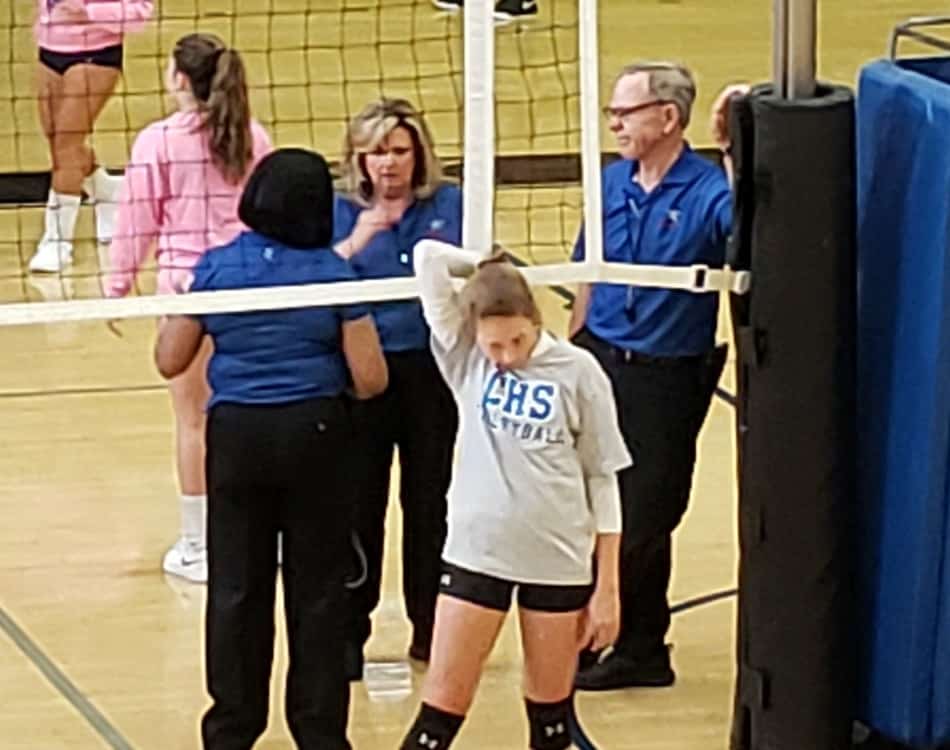
The 2nd Referee:
- Controls the players in their warm-up areas.
- Controls the work of the scorer(s).
- Verifies the players are aligned according to the line-up at the beginning of the game and as needed throughout.
- Supervises the teams’ conduct in the bench area and reports it to the 1st Referee if needed.
- Authorizes, controls or rejects game interruptions.
- Controls and reports if necessary, the number of time-outs and substitutions each team has used.
- In case of an injury, manages the injury recovery time and substitution.
- Checks the floor condition, focusing on the front zone (the attack zone).
- Monitors that the balls still fulfill the regulations during the game.
- May (without whistling) signal faults outside his or her jurisdiction, to aid the 1st Referee, but must not insist on them.
- Will indicate by hand signals the calls along with the 1st Referee.
- At the end of the match, will check and sign the score sheet.
What Does The Scorer Do In Volleyball?
The scorer operates seated at a table across from the 1st Referee. The scorer fills in the score sheet according to the rules and co-operates with the 2nd Referee to fulfill their duties.
Prior to the match, the scorer will receive the data from each team like the starting line-up and the names and numbers of the liberos and input it on the score sheet.
During the match the scorer will:
- Record the points scored on the score sheet.
- Track the serving order and notify the 2nd Referee if someone serves out of order.
- Notifies the 2nd Referee of, and records, substitutions and time-outs being requested.
- Notifies the referees of the end of the sets.
- Announces the 8th point during tie-breaker sets so the teams can switch sides.
- Record all sanctions and warnings.
- Controls the length of the intervals between sets.
At the end of the match, the scorer records the final result and completes any incomplete notations. Then they sign the scorecard themselves, before getting the captains and referees to each sign it.
What Does An Assistant Scorer Do In Volleyball?
The assistant scorer works at the table beside the scorer. Their main function is to track the replacements involving the Liberos. If the scorer is unable to continue their duties, the assistant would take over.
Before the game, the assistant scorer prepares the Libero Control Sheet. During the game, they track all replacements and any re-designations. If there is any violation with the libero replacements, the assistant scorer will notify the 2nd Referee.
They operate the manual scoreboard during the game and verify that it matches the score sheet.
At the end of the match, the assistant scorer signs the Libero Control Sheet and signs the score sheet as well.
What Are The Duties Of The Linesman In Volleyball?
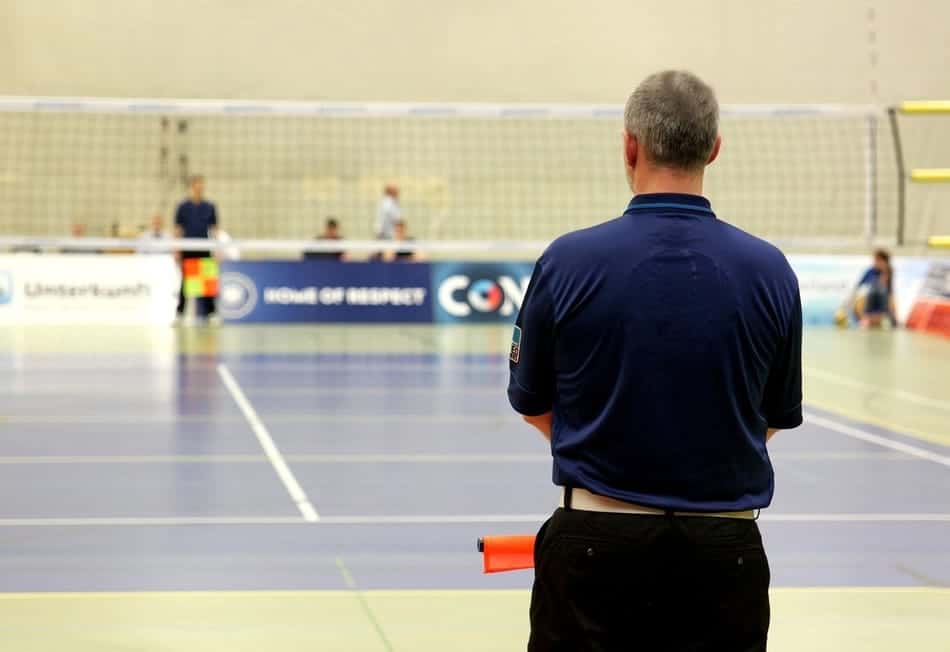
In international matches, 4 line judges are required. In most other settings, only 2 are used. These line judges will stand at the corners of the court and if there are only 2, diagonally opposite one another at the corner of each referee’s right-hand side.
The line judge’s primary responsibility is to make the call of whether a ball is in or out of bounds when it lands near the line and signal “in” or “out.”
They do however help by making many other calls:
- If a player on the receiving side has touched the ball before it goes out of bounds,
- The ball hitting the antenna or any other obstacle that’s out of bounds,
- The ball crossing the net outside of the “crossing space” (the space between the antennae),
- The server stepping on the line or into the court before the service is complete,
- Any other player stepping out of bounds during the service.
Line Judges are often volunteering at the lower levels of play but have a responsibility to understand these rules. They should not hesitate to signal the referee when these situations occur. The 1st Referee may ask a line judge to repeat their signal if it was unclear.
Can You Challenge A Call In Volleyball?
The rules actually declare that the first referee will not permit any discussion about his or her decisions. They have control and power over the entire match, the teams, and the other officials.
If a player, a team or a coach has some objection about a call, the team’s captain is the only person who is supposed to address the referee. The captain may respectfully ask for an explanation about the call.
If the referee’s explanation does not satisfy the captain’s objection, the captain has the right to lodge a protest. The captain must tell the referee at that point during the conversation, “I reserve the right to protest that decision.” Then, at the end of the match, the captain may file a protest about that particular decision.
How Much Does A Volleyball Referee Make?
Pay can vary quite a bit from level to level and from area to area. Obviously, the higher level of play requires higher qualifications and will pay much more than at the lower levels.
According to the United States Department of Labor, the range of annual salaries for all referees, umpires and other sports officials collected in 2017 were from $18,360 to $56,100. Keep in mind these statistics are including not only
These salaries are including officials from all across the country and reffing all levels and age groups.
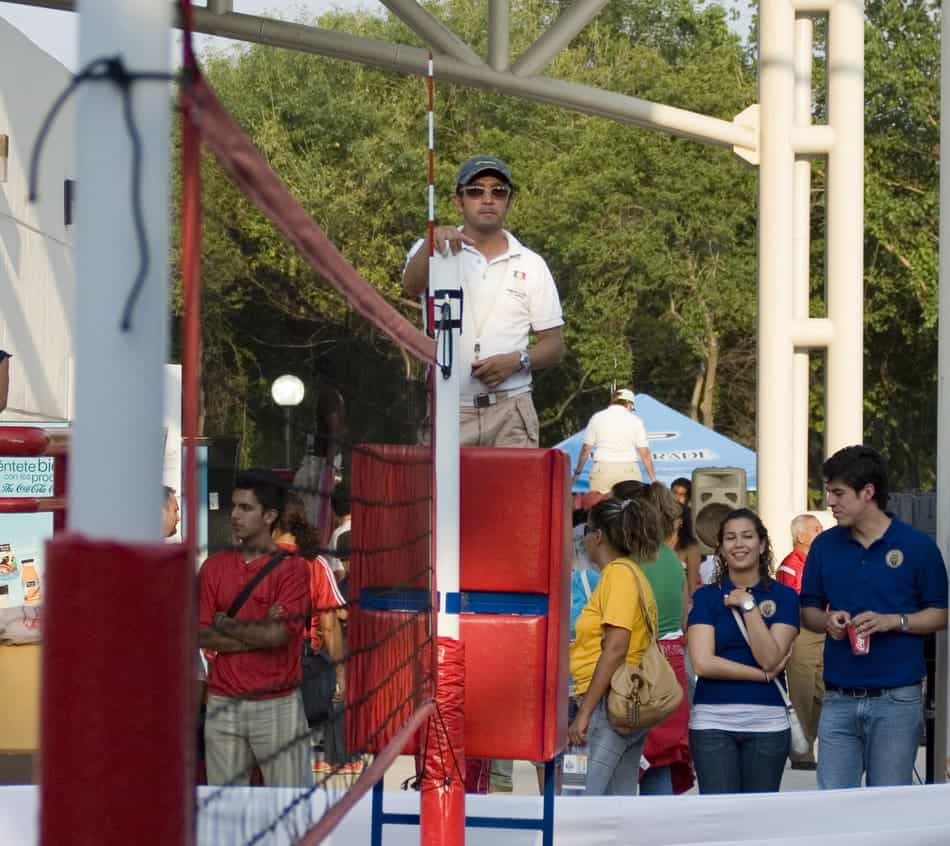
The pay range is considered quite low for someone trying to make it their full-time profession unless they can take it to the highest levels. Many referees are part-time sports enthusiasts who have a passion for the game and enjoy the extra work and income.
How To Become A Referee In Volleyball
If you would like to pursue becoming a referee, it can be a wonderful way to stay in touch with a game you love. USA Volleyball has this website to help people like you explore their options and find the path to becoming a referee.
You will need to:
- Sign up in your region of the country,
- Usually, attend a clinic either in person or online,
- Take an exam to be evaluated as a referee or scorer,
- Possibly have to pass a background check.
Related Questions
How Do You Know If The Ball Is In Or Out In Volleyball?
In volleyball, if the ball touches any part of the court including the line, it is counted as in bounds.
For a more detailed explanation, visit this article, Volleyball
What Are The Equipment Used In Volleyball?
The basic equipment in volleyball is the ball, the net, uniforms, and knee pads.
What Is A Touch In Volleyball?
A touch is any contact with the ball, whether on purpose or by accident. If the ball touches any part of the player’s body, hair, or clothing, it is considered a touch.
Photo credits:
Feature image by martagalpe3 from Pixabay.
1st Referee image by Arctic Warrior on flickr.com: https://creativecommons.org/licenses/by-nd/2.0/
Line judge image by Tania Van den Berghen from Pixabay.
Sand volleyball referee image by pato garza on flickr.com: https://creativecommons.org/licenses/by/2.0/
Recent Posts
Athletes, listen up! Do you have a closet full of old jerseys, sweatpants, and tees that you just can't seem to part with? Well, dust them off, because you're sitting on a goldmine of fashion...
You may have heard, or you may have noticed, that there's been a change to the rule about double contact in volleyball. In 2022, an experimental rule change began to be implemented, where the double...
